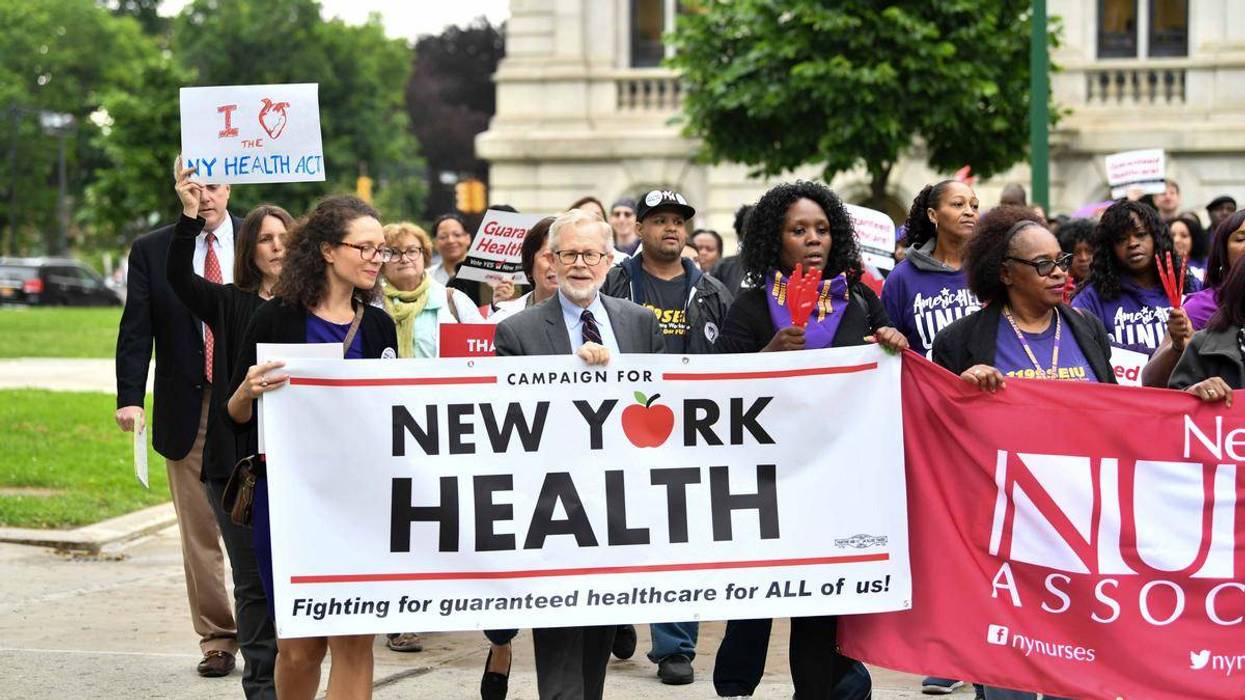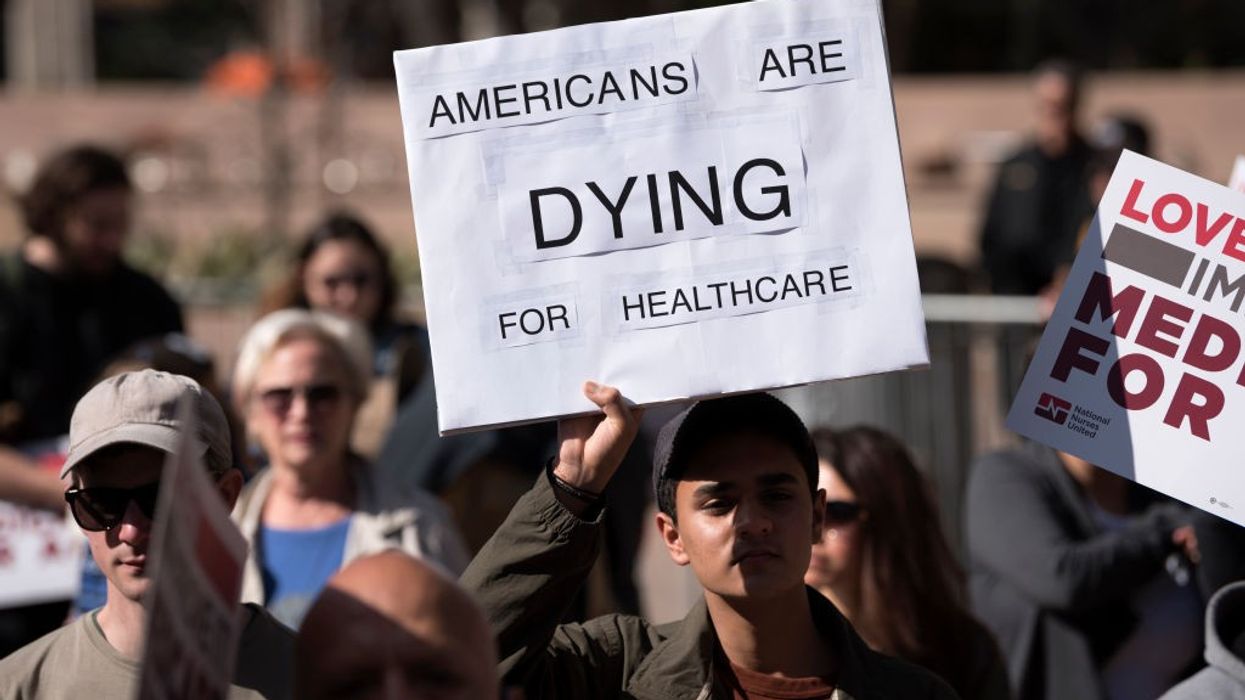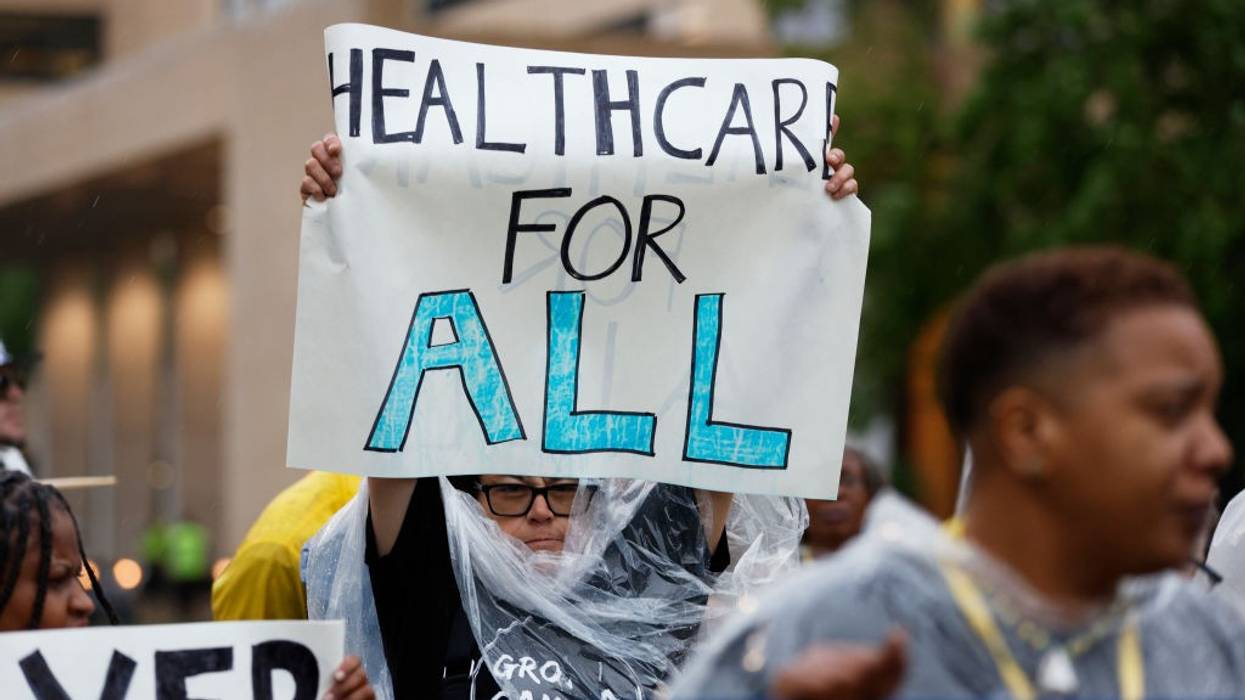Years later, in June of 2022, Gary Bent had a recurrence of melanoma in the form of a bleeding lesion in his brain. Following a brain surgery, his neurosurgeon recommended he stay at a specialty hospital that could provide intensive care during his recovery. Despite being accepted as a patient, his Medicare Advantage plan said he had to go to a different facility, which his daughter, Megan Bent, described as “substandard.”
While he was in the rehab facility, Gary’s Medicare Advantage provider attempted to discharge him three times; Megan and her mother, Gloria Bent, filed appeals each time, and were twice successful. However, after losing the third appeal, Gary was discharged from the facility. Once he got home, he had a fever and was experiencing neck pain; he had been discharged from the facility while infected with bacterial meningitis.
After being readmitted for another three weeks, he was again discharged from the hospital and remained at home under the care of Megan and Gloria until he passed away shortly after. Following Gary’s death, Megan and her mother learned that Gary’s care was denied by an artificial intelligence program used by his Medicare Advantage provider.
The Bent family’s story is one shared by many families throughout the country, and despite increased criticism of Medicare Advantage in recent years, a growing number of unions have agreed to—or been forced into—moving their retired members out of traditional Medicare with supplemental MediGap coverage and on to these privatized plans.
To address this issue, the Labor Campaign for Single Payer recently hosted a webinar titled “Medicare Advantage and the Privatization of Healthcare: What Unions and Workers Need to Know,” which featured remarks from AFA-CWA president Sara Nelson, Sen. Elizabeth Warren (D-Mass.), and Rep. Pramila Jayapal (D-Wash.). The webinar also included informative and important presentations from Rose Roach, national coordinator for the Labor Campaign for Single Payer and Dr. Belinda McIntosh, board member for Physicians for a National Health Program, as well as testimony from Megan Bent and another Connecticut retiree, James Russell, both of whom are activists with the health justice advocacy organization Be A Hero.
Rose Roach opened her presentation by stating that the organization “never want(ed) to shame a union or their workers.” In truth, negotiators at the bargaining table are in a difficult position when it comes to negotiating retiree health benefits. While traditional Medicare rarely subjects patients to prior authorizations and allows them to see virtually any provider in the country, the program alone only covers 80% of healthcare costs. Therefore, unions must negotiate the purchase of a supplemental (MediGap) policy in order to cover the other 20%, with the combined premiums costing hundreds of dollars a month.
Medicare Advantage plans, on the other hand, often have low- or zero-dollar premiums and include coverage for dental, vision, hearing, and prescriptions (though the value of these additional benefits is often much less than beneficiaries were led to believe). However, patients in Medicare Advantage regularly experience claim denials and are often restricted to seeing a narrow set of in-network providers to get care. Insurance companies seek to maximize their profits by minimizing the amount of care their beneficiaries receive. The long-term costs of having to pay out of pocket for expensive treatments that are often not covered under Medicare Advantage plans can leave retirees and their families under mountains of medical debt.
Union negotiators may embrace Medicare Advantage because they are not fully aware of the long-term costs to their retirees, and because it looks like an opportunity to save money on retiree healthcare, which increases their leverage to bargain for better wages and benefits for in-service workers.
Despite increased public attention to the shortcomings of Medicare Advantage plans, many negotiators do not have the full picture of what it means to enter into a Medicare Advantage contract, and so the Labor Campaign for Single Payer developed a White Paper that highlights many of the important differences between the two options and includes a list of questions for negotiators to ask at the bargaining table, which they hope will result in more informed negotiations and fewer retired union workers ending up on Medicare Advantage.
In her remarks, Sen. Warren asserted that the name “Medicare Advantage” is misleading, arguing that the program “isn’t part of Medicare at all, and certainly not an advantage.”
Congresswoman Jayapal, the lead sponsor of the Medicare for All Act in the U.S. House, urged the attendees to make this issue a top priority in the coming years, saying “we can’t end up with Medicare Advantage for All, we need Medicare for All, and we need your organizing, your mobilizing, and your collective power to fight back against the giant insurance companies that are trying to buy up and destroy the vital public program.”
Indeed, insurance companies like UnitedHealthcare are doing everything they can to increase funding for Medicare Advantage and get as many people on to their plans as possible, often through deceptive marketing tactics and aggressive lobbying campaigns. This is because Medicare Advantage is the leading driver of corporate profits in healthcare.
In 2024, the Medicare Payment Advisory Commission (MedPAC), and independent government commission tasked with advising Congress on Medicare policy, estimated overpayments to Medicare Advantage providers to be roughly $80 billion dollars every year, while Physicians for a National Health Program released a similar report that estimated overpayments could be closer to $140 billion dollars annually. Roach’s presentation analyzed the various ways in which Medicare Advantage providers receive more money than was intended, which include upcoding, favorable selection and deselection, and quality and county bonuses. Of greatest concern to lawmakers on both sides of the aisle is ‘upcoding,’ a term referring to the insurance industry’s fraudulent practice of applying diagnostic codes to a patient’s chart in order to charge the federal government more money.
Insurance companies like UnitedHealthcare are doing everything they can to increase funding for Medicare Advantage and get as many people on to their plans as possible...
Much has been written about upcoding in recent years, including a bombshell report from the New York Times in 2022. Despite this extensive level of news coverage, Secretary of Health and Human Services Robert F. Kennedy Jr. was seemingly caught off guard by a line of questioning from Congresswoman Alexandria Ocasio-Cortez (D-NY), who asked Sec. Kennedy whether he was aware of any ongoing investigations, led by the Department of Justice, into this nefarious corporate practice. Kennedy, befuddled, asked the Congresswoman what she was referring to when she claimed there were “80 million dollars” of overpayments in Medicare Advantage, to which Congresswoman Ocasio-Cortez had to clarify she said “80 billion dollars a year…billion, with a ‘b.’”
A centerpiece of the insurance industry’s public relations campaign to pressure the federal government to increase funding for Medicare Advantage is the claim that the program is solving the health equity gap among eligible Medicare beneficiaries. Studies funded by AHIP, the insurance industry’s biggest lobbyist, claim that Medicare Advantage is providing better care at lower cost to beneficiaries. Dr. Belinda McIntosh repudiated the industry’s claim with a detailed presentation highlighting disparate health outcomes among various racial groups, concluding that beneficiaries who are black, hispanic, or members of “the usual disenfranchised groups are being left with no choice but to accept an inferior product with major problems, that wealthier and more privileged Americans are less likely to accept.” Indeed, as Dr. McIntosh stated, Black and Hispanic beneficiaries were denied care at rates of 20% and 23% respectively by their Medicare Advantage plans, as compared to 15% of claims being denied for White beneficiaries.
While the world of health policy is often laden with statistics and figures, everyone has a story about the shortcomings of the American healthcare system. Stories like that of the Bent family ring true to millions of others, including James Russell, a retired academic who, like Gary, used to work for the state of Connecticut and is on a Medicare Advantage plan. During the webinar, Russell told his story of being diagnosed with stage IV lung cancer and having to seek treatment from a number of different providers in different corners of the country. Megan, Gloria, and James shared their stories and discussed their collaborative work to fight for a better healthcare system as part of their work with Be A Hero.
While the world of health policy is often laden with statistics and figures, everyone has a story about the shortcomings of the American healthcare system.
The Labor Campaign for Single Payer is demanding that the federal government “level the playing field” between traditional Medicare and Medicare Advantage. While the former is constantly under financial strain, the latter benefits from unchecked corporate handouts to insurers, who then increase their profits at the expense of patients by delaying and denying care. Just as is the case when a union negotiator is in a difficult position in picking between traditional Medicare and Medicare Advantage, so too are individual beneficiaries, who must either pay hundreds of dollars a month in premiums for traditional Medicare and a supplemental policy, or instead sign over their Medicare benefits to an insurance corporation that does not care about them. In order to “level the playing field” between traditional Medicare and Medicare Advantage, activists and lawmakers seek to expand traditional Medicare to cover vision, dental and hearing, as well as to set an out-of-pocket-cap on healthcare spending by beneficiaries, which could reduce the necessity of a MediGap policy and thereby reduce the monthly premiums of traditional Medicare.
The Labor Campaign for Single Payer encouraged attendees of the webinar to go to their unions and pass a resolution stating support to level the playing field, which has passed at conventions of the Washington State Labor Council AFL-CIO, the Minnesota AFL-CIO and the Maine AFL-CIO. Additionally, organizers of the webinar encouraged attendees to review and utilize their White Paper to discuss Medicare and Medicare Advantage with their fellow workers and union’s leadership and plan a bargaining strategy that pushes back on the claim that Medicare Advantage is a “win-win” solution to the problem of the high cost of retiree healthcare.
The White Paper, the resolution and the recording of the June 18 Webinar are available on the Labor Campaign for Single Payer’s Resources page, along with a variety of other educational resources on Medicare Advantage and the fight to guarantee healthcare to all workers and people.




